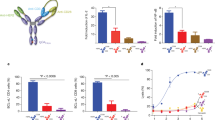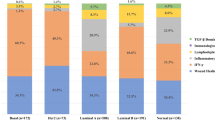Abstract
Given the plethora of well–documented breast carcinoma–associated antigens in humans including MAGE–1, –2 and –3, mutated p53, p21ras, HER–2/neu and DF3/MUC–1, coupled with evidence that humoral and cytotoxic T–cell responses against these antigens exist1–6, the central dilemma facing tumor immunologists is why the host immune response is so inefficient. One possibility is that tumor cells themselves are either inefficient or ineffective antigen–presenting cells (APCs). The failure of tumor cells to function as APCs may be due to their inability to process and present the antigen, the absence or insufficient numbers of adhesion and costimulatory molecules or, potentially, the secretion of inhibitory cytokines. Therefore, we sought to determine whether human breast cancer cell lines could function as APCs and, if not, to identify mechanism(s) responsible for this defect. Here, we show that human breast cancer cell lines fail to present alloantigen. This defect does not reside in their inherent capacity to present antigen but rather is due to apoptosis of activated T cells induced by exposure to the breast carcinoma–associated mucin antigen, DF3/MUC1. These results support the hypothesis that DF3/MUC1 may contribute to the paucity of clinically significant anticarcinoma–specific immune responses.
This is a preview of subscription content, access via your institution
Access options
Subscribe to this journal
Receive 12 print issues and online access
$209.00 per year
only $17.42 per issue
Buy this article
- Purchase on Springer Link
- Instant access to full article PDF
Prices may be subject to local taxes which are calculated during checkout
Similar content being viewed by others
References
van de Bruggen, P. et al. A gene encoding an antigen recognized by cytolytic T lymphocytes on a human melanoma. Science. 254, 1643–1647 (1991).
Schlichtholz, B., Legros, Y. & Gillet, D. The immune response to p53 in breast can cer patients is directed against immunodominant epitopes unrelated to the mutational hot spot. Cancer Res. 52, 6380–6384 (1992).
Jung, V. et al. Expression and reconstitution of a biologically active human inter-feron-gamma receptor in hamster cells. J. Biol Chem. 265, 1827–1830 (1990).
Disis, M.L. et al Existent T-cell and antibody immunity to HER-2/neu protein in patients with breast cancer. Cancer Res. 54, 16–20 (1994).
Barnd, D.L., Lan, M.S., Metzgar, R.S. & Finn, O.J. Specific, major histocompatibility complex-unrestricted recognition of tumor-associated mucins by human cytotoxic T cells. Proc. Natl Acad. Scl USA 86, 7159–7163 (1989).
Jerome, K.R. et al. Cytotoxic T-lymphocytes derived from patients with breast adenocarcinoma recognize an epitope present on the protein core of a mucin molecule preferentially expressed by malignant cells. Cancer Res. 51, 2908–2916 (1991).
Gendler, S., Taylor-Papadimitriou, J., Duhig, T., Rothbard, J. & Burchell, J. A highly immunogenic region of a human polymorphic epithelial mucin expressed by carcinomas is made up of tandem repeats. J. Biol. Chem. 263, 12820–12823 (1988).
Siddiqui, J. et al. Isolation and sequencing of a cDNA coding for the human DF3 breast carcinoma-associated antigen. Proc. Natl. Acad. Sci. USA 85, 2320–2323 (1988).
Wesseling, J., van der Valk, S. & Hilkens, J. A mechanism for inhibition of E-cadherin-mediated cell-cell adhesion by the membrane-associated mucin episialin/MUC1. Mol. Biol. Cell 7, 565–577 (1996).
Ligtenberg, M., Buijs, F., Vos, H. & Hilkens, J. Suppression of cellular aggregation by high levels of episialin. Cancer Res. 52, 2318–2324 (1992).
van de Wiel-van Kemenade, E. et al. Episialin (MUC1) inhibits cytotoxic lympho cyte-target cell interaction. J lmmunol. 151, 767–776 (1993).
Girling, A. et al A core protein epitope of the polymorphic epithelial mucin detected by the monoclonal antibody SM-3 is selectively exposed in a range of primary carcinomas. Int. J. Cancer 43, 1072–1076 (1989).
Hull, S. et al Oligosaccharide differences in the DF3 sialomucin antigen from nor mal human milk and the BT-20 human breast carcinoma cell line. Cancer Commun. 1, 261–267 (1989).
Kotera, Y., Fontenot, J.D., Pecher, G., Metzgar, R.S. & Finn, O.J. Humoral immunity against a tandem repeat epitope of human mucin MUC-1 in sera from breast, pancreatic, and colon cancer patients. Cancer Res. 54, 2856–2860 (1994).
McKolanis, J., Pecher, G., Lotze, M. & Finn, O. Mucin reactive CTL induced by in vivo immunization [Abstr.]. Proc. Am. Assoc. Cancer Res. 87, 3144 (1996).
Boussiotis, V.A., Freeman, G.J., Gray, G.S., Gribben, J.G. & Nadler, L.M. B7 but not intercellular adhesion molecule-1 costimulation prevents the induction of human alloantigen-specific tolerance. J. Exp. Med. 178, 1753–1763 (1993).
Dranoff, G. et al. Vaccination with irradiated tumor cells engineered to secrete murine granulocyte-macrophage colony-stimulating factor stimulates potent, specific, and long-lasting anti-tumor immunity. Proc. Natl. Acad. Sci. USA 90, 3539–3543 (1993).
Gimmi, C.D. et al. B-cell surface antigen B7 provides a costimulatory signal that induces T cells to proliferate and secrete interleukin 2. Proc. Natl. Acad. Sci. USA 88, 6575–6579 (1991).
Hayes, D.F., Silberstein, D.S., Rodrigue, S. & Kufe, D.W. DF3 antigen, a human epithelial cell mucin, inhibits adhesion of eosinophils to antibody-coated targets. J. Immunol. 145, 962–970 (1990).
Kufe, D.W. et al Differential reactivity of a novel monoclonal antibody (DF3) with human malignant versus benign breast tumors. Hybridoma 3, 223–232 (1984).
Author information
Authors and Affiliations
Rights and permissions
About this article
Cite this article
Gimmi, C., Morrison, B., Mainprice, B. et al. Breast cancer–associated antigen, DF3/MUC1, induces apoptosis of activated human T cells. Nat Med 2, 1367–1370 (1996). https://doi.org/10.1038/nm1296-1367
Received:
Accepted:
Issue Date:
DOI: https://doi.org/10.1038/nm1296-1367
This article is cited by
-
MUC1 is a potential target to overcome trastuzumab resistance in breast cancer therapy
Cancer Cell International (2022)
-
Mucin 21 confers resistance to apoptosis in an O-glycosylation-dependent manner
Cell Death Discovery (2022)
-
Combination of tumor markers predicts progression and pathological response in patients with locally advanced gastric cancer after neoadjuvant chemotherapy treatment
BMC Gastroenterology (2021)
-
Prognostic role of CA15.3 in 7942 patients with operable breast cancer
Breast Cancer Research and Treatment (2012)
-
Potential rescue, survival and differentiation of cancer stem cells and primary non-transformed stem cells by monocyte-induced split anergy in natural killer cells
Cancer Immunology, Immunotherapy (2012)



